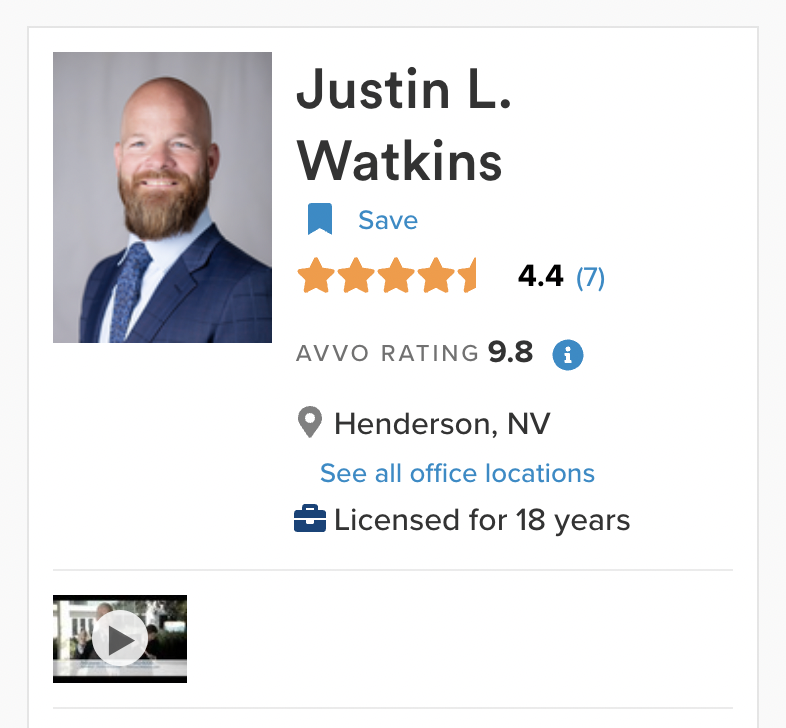How To Find the Best Personal Injury Attorney in Nevada
You could face expensive treatment and therapy when you get injured in an accident. At the same time, your injuries might disable you from working. This puts you in a difficult position. You need medical treatment so you can work, and you need to work so you can pay for medical treatment.
If your injuries resulted from someone else’s negligence, you have another option. You can hire a personal injury attorney and pursue a personal injury claim in Las Vegas and throughout Nevada. Your compensation will cover your medical expenses, lost wages, and diminished earning capacity. This will help you meet your daily needs while focusing on your health.
Here are some suggestions about finding the best personal injury attorney for your case in Nevada.
Gather Names of Personal Injury Lawyers Near You
Gather names of lawyers who practice injury law. You have many sources for names, including:
Lawyer Recommendations from Friends and Family
Talk to friends, family members, neighbors, and co-workers about the lawyers they used for their cases. Former clients often provide the most accurate reviews of lawyers because they have direct experience seeing their lawyers in action.
If you do not know anyone who had an injury case, talk to people about lawyers they know. Legal professionals often know who has a good reputation even if they practice in a different field. If possible, gather names of Nevada personal injury lawyers from judges, paralegals, or other attorneys.
Also, look for non-recommendations. If someone has heard negative things about a lawyer or had a bad experience with them, exercise caution if hiring that lawyer.
Legal Directories
Many legal directories, like Avvo and Martindale-Hubbell, give lawyer ratings based on algorithms or peer reviews. Lawyers are rated on Avvo from 1 to 10. A score of six or more is considered a good rating. You should look for an attorney who has an Avvo rating of 9 or higher, such as attorney Justin Watkins, who practices personal injury law in Las Vegas, Nevada.

As a Las Vegas personal injury lawyer, Justin takes pride in earning high ratings from legal directories because they reflect his knowledge, experience, and ethics in the Nevada personal injury law field.
These legal directories also provide client review ratings. Since prior clients can speak directly to a lawyer’s client-handling skills, you might also find these ratings helpful.
Lawyer Referral Services
The State Bar of Nevada operates a lawyer referral service. When you contact this service by phone or online, the service will help you identify the type of lawyer you need. The service then provides the name of a lawyer you can contact for a 30-minute consultation for $45.
The benefit of the lawyer referral service is that participating lawyers are members of the Nevada Bar and have malpractice insurance. The downside is that the referral service does not screen lawyers based on quality. You could receive the name of a good lawyer or an average lawyer from the referral service.
Online Lawyer Searches
Online searches can often identify the law firms with the largest and most successful practices in your area. But sometimes clients want more than the firm that advertises the most. The firms that have the most prominent websites do not always provide the most personalized service.
And online reviews are not always accurate. There is no way to verify that a Google or Yelp review was left by a client. Sometimes losing parties or other non-clients leave negative reviews to try to tank a lawyer’s online rating.
Meet With Your Prospects – Most Nevada Personal Injury Lawyers Offer a Free Consultation
After gathering the names of prospective lawyers in Nevada, schedule free consultations with as many of them as possible. The more lawyers you speak to, the better the chances are that you will find a lawyer compatible with you and your case.
During your free consultation, discuss your case and the lawyer’s process for representing you.
Ask questions like:
- How much do you charge?
- What are the strengths and weaknesses of my case?
- What range of outcomes should I expect?
- Does my case have any impending deadlines?
- Who will handle my case?
- How will I get updates about my claim?
- How long will my case take?
Ideally, you will ask enough questions that you will have no surprises after you hire the attorney. You will have a much better relationship with your lawyer if you minimize the risk of misunderstandings.
The Process of Selecting a Nevada Personal Injury Attorney To Represent You
To pick a lawyer, you must understand what your lawyer will do in your case. When you know the skills your lawyer needs, you will have an easier time picking one.
Some skills your lawyer needs include:
Organizational Skills
Your lawyer will investigate your case and gather evidence. This evidence will help you prove the liability of the at-fault party and the losses you suffered. The law firm and lawyer you hire will need to keep your evidence organized so they can use it in your case.
Your lawyer will also need to keep track of the deadlines in your case. Missing a deadline can have catastrophic consequences, so your personal injury attorney must ensure that your filings and hearing dates get handled on time.
Knowledge of Personal Injury Law
You need a lawyer with knowledge of the law. The lawyer must take the facts of your case and apply the law to determine the likely outcome and value.
Experience Handling Your Type of Claim
The lawyer must have the experience to anticipate what will happen in your case and deal with it. While the same legal principles apply to most personal injury cases, you want a lawyer with experience dealing with your case’s specific issues.
For example, if you were injured due to medical malpractice, you should probably not hire a lawyer who focuses only on car accidents.
Excellent Communication Skills
Lawyers must have skills in two forms of communication. When talking to you, the lawyer must objectively assess your case and provide unbiased legal advice. When negotiating with insurance adjusters or arguing before a judge or jury, the lawyer must advocate for your position.
When you have your free consultation, note the lawyer’s ability to explain the law and how it fits your case. If a lawyer can explain things clearly to you, they will probably do a good job explaining things to a claims adjuster, judge, or jury.
Hire the Best Nevada Personal Injury Lawyer for Your Case
When you settle on a lawyer, ask for a copy of the lawyer’s fee agreement. Under Nevada’s Rules of Professional Conduct, the agreement must explain how the lawyer will calculate their fee and what you will owe at the end of the case. Review the agreement carefully and discuss any questions with the attorney.
Once you sign the fee agreement, the lawyer will start working on your case. If you choose the right lawyer, you should have a productive relationship as you pursue fair personal injury compensation.


